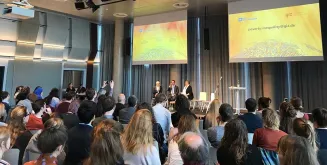Advancing agency and increasing dignity can reduce inequality and promote human development, commentators said at an event to mark the launch of the 2019 Human Development Report (HDR) in Bonn last week.
UNV, in partnership with the Deutsche Gesellschaft für internationale Zusammenarbeit (GIZ), a Bonn-based development agency providing services in the fields of sustainable development and international education, were proud to host Pedro Conceição, lead author of the 2019 HDR, in a presentation of the report's essential findings. The roundtable event also included an interactive panel discussion and remarks from the field, including from UN Volunteer Thu Huong Dao, a disability rights officer in Viet Nam, and was facilitated by Susan Bonney-Cox, journalist and Deputy Equal Opportunity Representative at Deutsche Welle.
"Fighting inequality, together with perhaps climate change, is the most important issue to address if we are to give a future to mankind." – Andreas Proksch, Director General, Sector and Global Programmes, GIZ
Almost 30 years since its inception, the Human Development Report remains a powerful voice and guides policy makers in their efforts to understand and address human inequality. This year’s report Beyond income, Beyond averages, Beyond today: Inequalities in human development in the 21st century, examines how inequalities weaken social cohesion and economic growth and damage people’s trust in government, institutions and in each other.
There is strong evidence that income inequality has gone down in recent years, but this contrasts with perception of people worldwide. All the SDGs have the objective to reduce inequality at their core: to ensure that no one is left behind – and not only those at the bottom, but everyone. -- Pedro Conceição, lead author of the 2019 HDR, UNDP
By looking beyond income, beyond averages, and beyond today, the report presents analysis, ideas and policy options to tackle the drivers of inequality and recognizes that many inequalities are the symptom of an unfair system rather than the cause.
“This report has clearly defined not only existing inequalities, but also ways in which future inequalities can be prevented. As someone who has spent decades fighting for equal rights, I believe gender is the area with the greatest potential for improvement, but also for real change… If inequalities are to be balanced before birth, then women will be the key.” – Susan Bonney-Cox, journalist and Deputy Equal Opportunity Representative, Deutsche Welle
For UNV, the report marks an important step forward in understanding the drivers of inequality, and importantly, its root causes. It provides further impetus to look even more deeply at how volunteering can advance social, economic and political agency and support people to act for a more equal world. Ultimately, the United Nations and UNV promote volunteerism because it can contribute to human dignity.
“As the 2019 HDR says, good policies start with good measurement, and a new generation of inequalities requires a new generation of measurement. We need clearer concepts tied to the challenges of the current times, a broader combination of data sources and sharper analytical tools.” --Toily Kurbanov, UNV Deputy Executive Coordinator
"Today we look at inequalities across the world to understand their influence on human dignity, but also to understand how people are taking action for a more equal world," Mr Kurbanov continued.
Thu Huong Dao is an advocate and example of the capacity for volunteering to reduce social marginalization and increase recognition. At the event, Thu spoke of how through volunteering, she is helping to advance the rights of disabled people in workplaces and is addressing inequality by reducing the social polarisation disabled people experience in the workplace.
"I am committed to building the right support systems around people with disabilities and ensuring they are visible and engaged in society. In doing that, we can challenge perceptions and change mindsets about what it means to be disabled." -- Thu Huong Dao, UN Volunteer Disability Rights Officer, Viet Nam
Since 2016, more than 75 governments have recognized the contribution of the world’s one billion volunteers to the SDGs in their Voluntary National Reviews. Nonetheless, there is much more that needs to be done to make this work more visible, more measurable, and ultimately, more valued.
Events such as this offer an important platform for the advancement of issues related to human development. In bringing key stakeholders and important actors together to consider how volunteerism, established with the right policies, may help redress issues related to inequality, there is hope for greater human dignity in the world.

